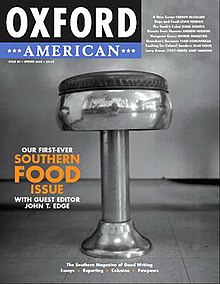Present incarnation
After $500,000 in financing was secured, the University of Central Arkansas in Conway, Arkansas, assumed the role as publisher and the magazine began publication once again in December 2004 as a quarterly. The magazine's editorial offices are on the first floor of Main Hall on the university grounds.
In 2008, a business secretary was discovered to have been embezzling money from the magazine since 2007. The secretary, who reported to the magazine's publisher Ray Wittenberg, pleaded guilty to theft and forgery and was briefly imprisoned and ordered to pay $102,000 in restitution to the magazine. [5]
In the aftermath of the embezzlement, the University of Central Arkansas demoted Wittenberg, loaned the magazine additional funds and assumed control of the business operations of the magazine, instituting the university's spokesman, Warwick Sabin, as publisher. [6]
In February 2009, a "mystery donor" gave the magazine $100,000 to repay the IRS debt incurred as a result of the embezzlement. [7] [8]
In July 2012, a few weeks before Issue 78 of the magazine was published, several editorial employees (including a recently fired senior editor and a recently fired intern) made allegations of sexual harassment against founder/editor Marc Smirnoff and managing editor Carol Ann Fitzgerald. [9] Within a week, the two were fired and publisher Warwick Sabin became interim editor. [10] [11] Smirnoff and Fitzgerald denied the allegations made against them and said they were not given a chance to defend themselves. [12] [13] One reporter concluded that "The Oxford American board didn’t have any clear misbehavioral conduct by Sminoff with which to warrant termination." [14] Smirnoff and Fitzgerald maintain that the allegations against them were the retaliatory actions of disgruntled employees and that they were not given a chance to defend themselves. [15]
In September 2012, when Roger D. Hodge replaced Warwick Sabin as the magazine's editor, Samir Husni, a journalism professor at the University of Mississippi and a former consultant to the magazine speculated on the uncertain future of the "iconic" magazine without its founder, Smirnoff. [16] In December 2012, the New York Times remarked that Smirnoff had been 'the most important editor out of the South since Willie Morris." [17] Hodge stepped down in May 2015. [18] In October 2015, Eliza Borné was named editor. [19] [20]
In October 2012, the Oxford American and the University of Central Arkansas renewed its alliance for five years on the understanding that the magazine will repay its debt, currently at $700,000, to the university. The magazine's chairman of the board, Richard N. Massey, pledged to repay the debt at a rate of about $69,000 a year over about five years. [21] In January 2016, Ryan Harris was named Executive Director of the Oxford American Literary Project, the non-profit organization that publishes the magazine. [22] In 2017, the Oxford American Literary Project announced the Oxford American Jeff Baskin Writers Fellowship, "to support the writing of a debut book of creative nonfiction." Molly McCully Brown was named the inaugural recipient of the fellowship, which includes a $10,000 living stipend, housing, and an editorial apprenticeship with the Oxford American. [23]
The magazine has won four National Magazine Awards, including a National Magazine Award in General Excellence (in February 2016), [24] [25] and is noted for its annual Southern music issue, which includes a complimentary CD. It has also featured previously unpublished work by William Faulkner, Margaret Walker, James Agee, and James Dickey. In 2017, the magazine published a special 25th anniversary issue, garnering praise from Washington Post book critic Ron Charles, who described the Oxford American as a "regional magazine that defies the regional label." [26] Across three issues that year, the magazine published excerpts of Jesmyn Ward's novel Sing, Unburied, Sing , which went on to win the 2017 National Book Award in Fiction. [26] In March 2018, the Oxford American published its 100th issue, featuring an original cover painting by Wayne White. [27]
In 2021, Danielle Amir Jackson succeeded Eliza Borné, becoming the first Black editor-in-chief in the magazine's history. In 2024, Jackson stepped down, and Sara A. Lewis became the magazine's new editor-in-chief. [28] [29]
